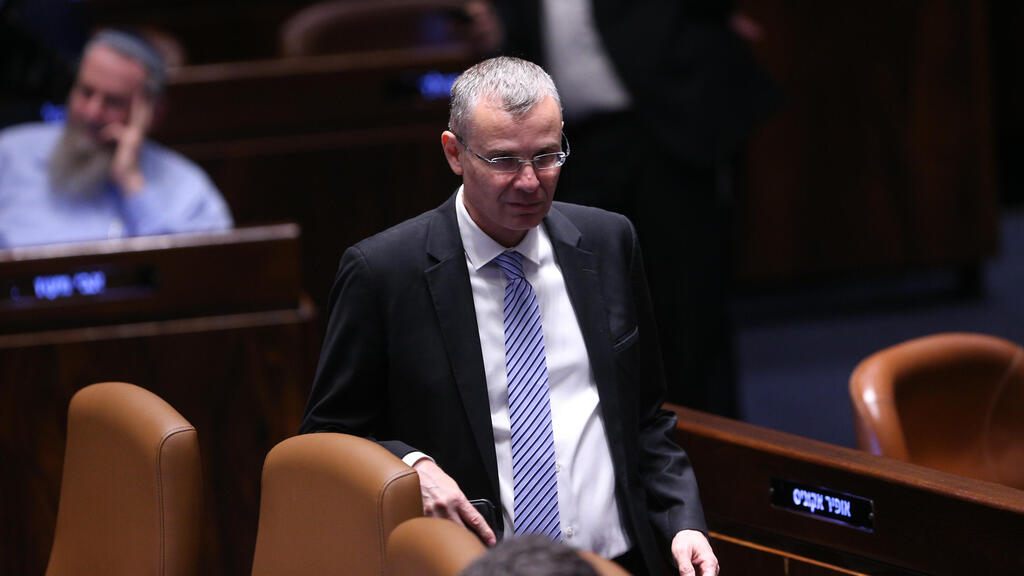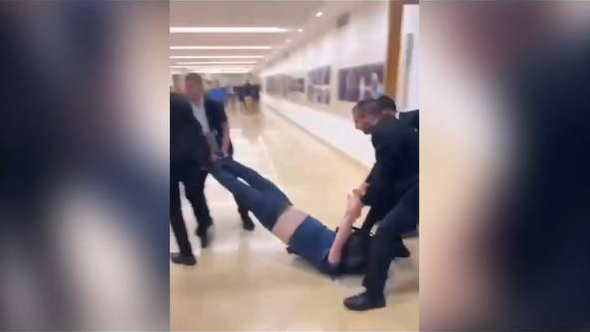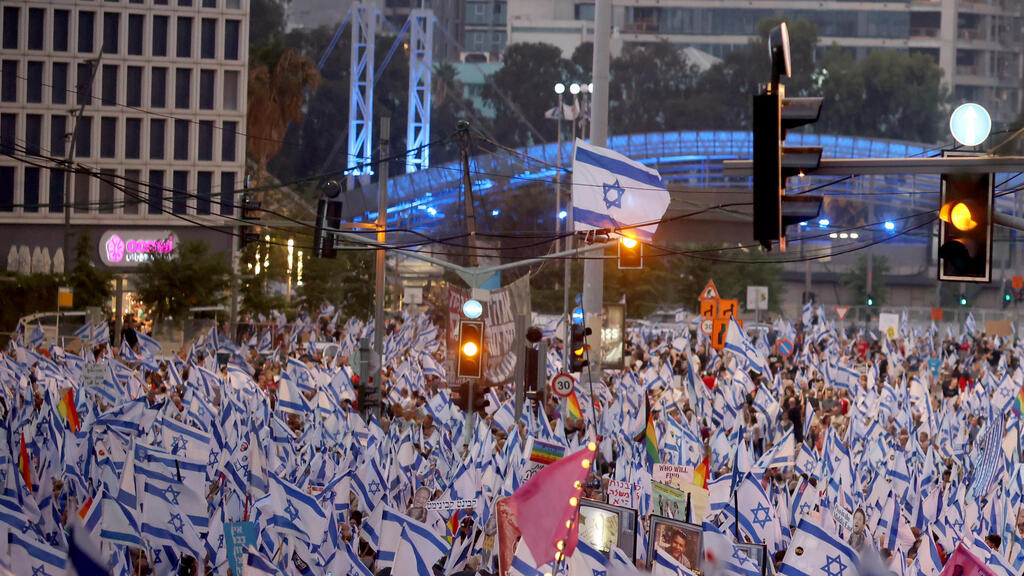Getting your Trinity Audio player ready...
Lawmakers late on Monday were poised to pass a bill that would weaken the Supreme Court's ability to weigh in on decisions made by the legislative and executive branches in what is seen as the first step in the government's planned change of the judicial system. Protesters breached the building and demonstrated outside the plenum.
More stories:
Justice Minister Yariv Levin said the bill would not place the government above the law but would enable it to carry out its policies. "We cannot allow any three random judges to decide that the vote of a majority is irrelevant when electing its leaders to carry out their policies. The public decides what is reasonable, not the judges," he said. The minister later called on the opposition to meet and reach broad agreements on the bill before it is brought to a final reading, which is expected before the end of the summer session at the end of July.
Religious Zionist lawmaker and an architect of the legislative agenda Simcha Rothman said the legislation is balanced. Opposition leader Yair Lapid said in response that the bill if passed will allow the coalition to appoint convicted criminals to high office with impunity. adding to concerns that the government would sack Attorney General Gali Baharav-Mirara and replace her with someone who may decide to end the criminal proceedings against Netanyahu who is facing corruption charges in the Jerusalem District Court. "Who are you Kidding?" Lapid asked. "How is this helping Israelis' wages, their security and Israel's standing in the world which you are destroying," Lapid said.
6 View gallery
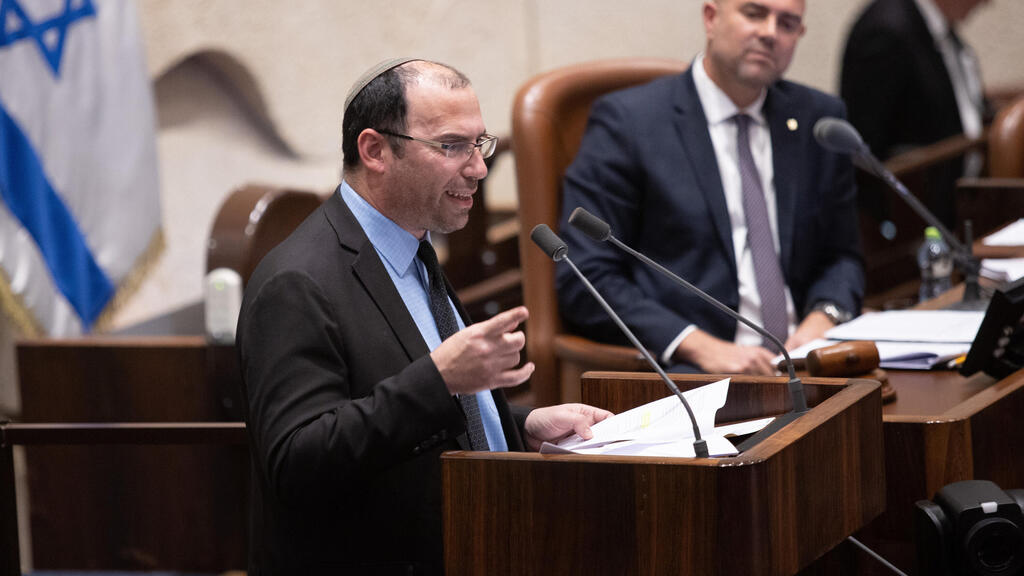

Simcha Rothman speaking ahead of the Knesset vote on the bill to curb the power of the courts
(Photo: Alex Kolomoisky)
Benny Gantz called on the prime minister not to turn his back on the country and its citizens. "Our relations with our most important strategic partner the U.S. is at an all-time low, our society and economy are in crisis," Gantz said adding that this was the last moment to prevent Israel's crash into the abyss.
The coalition has quickly shepherded the bill through the legislative process so that it can become law before the end of the Knesset's summer session on July 30. If it passes the vote on Monday, the legislation still faces two more votes in the Knesset plenum, usually held on the same day.
6 View gallery
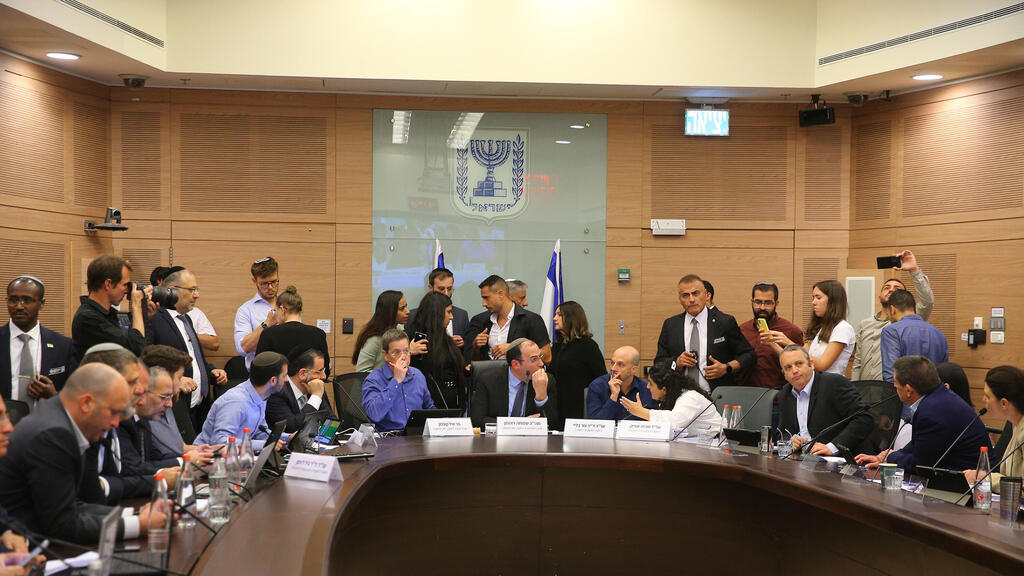

Knesset constitution committee meets to discuss an end to the reasonableness standard
(Photo: Alex Kolomoisky)
The legislation was approved by the Knesset's Constitution Committee last week. According to the wording of the proposal, "those who have judicial authority according to law, including the Supreme Court when sitting as a high court of justice, will not discuss or issue an order against the government, the prime minister, a minister or another elected official regarding the reasonableness of their decision."
The reasonableness clause currently authorizes the courts, including the Supreme Court, to overturn a decision of elected authorities, to the extent that it is found to be unreasonable. The reasonableness standard is part of the mechanism of checks and balances and is a significant tool used by the court to protect the public's rights against arbitrary decisions of the government and state authorities. If an elected official's decisions were influenced by extraneous, discriminatory or arbitrary considerations, or if significant information was not taken into account, such decisions can be disqualified on the grounds that they are unreasonable.
The reasonableness standard has been used by Israel's High Court justices for decades, but it was never written into the law. Its power is drawn from previous rulings of the Supreme Court, as well as from the Basic Law: The Judiciary which states that "The Supreme Court shall also sit as a High Court of Justice. When so sitting it shall deliberate matters, in which it deems it necessary to provide relief for the sake of justice, and are not under the jurisdiction of another court or tribunal."
According to Rothman, the reasonableness standard is not used by the court or the legal advisor to prevent corruption or to prevent illegal activity. Rothman claims that it is "a powerful legal tool – undemocratic - which takes the hands of the elected officials off of the steering wheel, and states that the final and exclusive decision on any issue is only in the hands of the court, in complete opposition to the principle of separation of powers."
The protest organizations said on Monday there are local organizations planning marches throughout the country, and that more and more sectors are encouraging their members to participate in the protest. Bank managers and other officials in the economic sector announced that they will allow their workers to participate in the protest.
"We are preparing for 34 large centers where there will be significant activities throughout the country besides marches," said a senior official at the protest headquarters.
"The State of Israel is in one of its most critical days. Tomorrow begins a new chapter in the protest. The civil forces are prepared for all the actions necessary to paralyze the state from Dan to Eilat," he said.
Nadav Galon, one of the leaders of the protests, told Ynet Live more about what is on tap for the Tuesday demonstrations.
"We will go out from the early hours of the morning for significant actions, which will send a message to the government – if the legislation is not stopped, then the state will stop. Our main action in the afternoon will be a protest at the National Bank of Israel. That is where we are directing all the people and all the forces in order to produce a significant protest there that conveys a message – if the government turns Israel into a dictatorship and the rules are broken, the protesters will also break the rules."
Regarding the possibility of flight disruptions, he said: "We will try to do everything we can to ensure there is no disruption, but our actions are actions that may cause a flight delay – and a flight delay can happen to anyone on any flight around the globe for reasons unrelated to the protest. So even if a few flights are delayed, it is a small price to pay, marginal, zero - compared to the price the day after the dictatorship."
The former CEO of the National Bank of Israel, Ze'ev Sharig, said in an interview with Ynet Live that he "fully supports the opponents of the revolution." However, he said he was divided about the demonstrations at the airport: "A demonstration yes, blocking passengers –no. That's my approach."
KNESSET VOTE: REASONABLENESS STANDARD BILL - GIL HOFFMAN
First published: 00:09, 07.11.23


